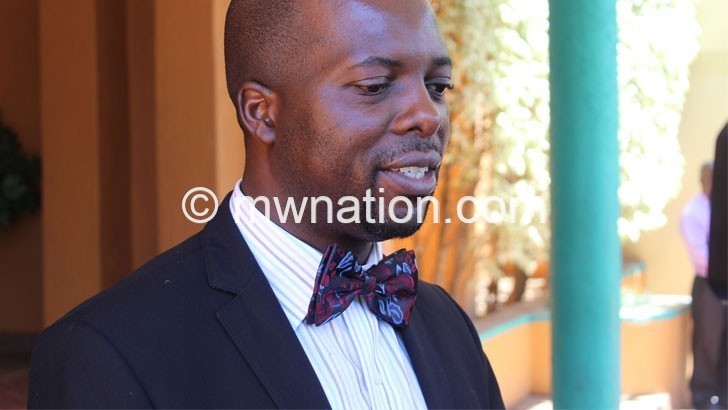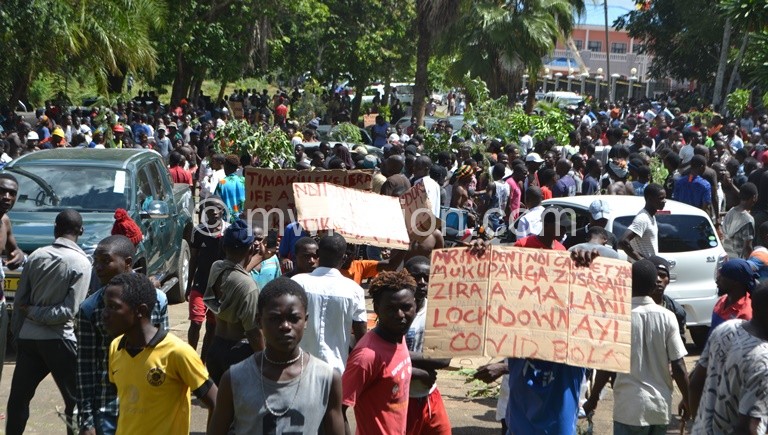NPC assesses lockdown
Malawi can lose $6.7 billion (about K4.9 trillion) in gross domestic product (GDP) in net present value terms over the next 30 years if moderate movement and livelihood restrictions (lockdown) are imposed.
The findings follow a novel coronavirus (Covid-19) medium to long-term impacts study of a moderate lockdown (social restrictions) by the National Planning Commission of Malawi (NPCM).
The findings show that at K4.9 trillion, lockdown damage to the economy and livelihoods vastly outweigh the potential social restriction benefits of net worth $228 million (about K168.7 billion).

For instance, the analysis projects that keeping schools closed as the situation is at the moment for nine months could generate a loss in future incomes for six million children, equivalent to $5.2 billion (about K3.8 trillion) in net present value terms.
The findings also reveal that the opportunity cost of a more productive future workforce in Malawi is much higher than even the most optimistic benefit estimate of $228 million (about K168.7 billion).
The outcomes demonstrate that a policy of school closures will leave Malawi much worse off socio-economically than the net health benefits.

On the health aspect, a moderate lockdown will likely reduce the Covid-19 death toll by 16 350 over the next five years. However, because of less health outreach, the study projects an increase in malnutrition, tuberculosis (4 000) and child mortality at 1 700 along with about 100 extra-maternal deaths.deaths from malaria at 3 700,
In a written response, NPCM director general Thomas Chataghalala Munthali was quick to caution that the study outcomes represent an evolving situation with new information coming to light regularly.
He said: “The recommendations in this brief should be considered in the context of a rapidly changing epidemiological, economic and information environment and are based on information as of early May 2020.
“To ensure that long-term health and economic welfare is not heavily compromised, at a minimum, crucial areas should not see their funding cut when considering diverting resources towards fighting the Covid-19.”
He emphasised that while the lockdown measures lasting nine months aimed at containing the Covid-19 could in the short-term reduce deaths by about 12 000, other non-Covid-19-related deaths during the same period are likely to reach 10 000.
Meanwhile, Ministry of Health (MoH)chief director of health services Dr. Charles Mwansambo referred the matter to experts at the Public Health Institute of Malawi who asked for more time to study the findings before commenting.
But MoH deputy director of preventive Mathews Kagoli said they have been waiting for such balanced analysis which cuts across the health and economic impact of Covid-19 for informed decision-making going forward.
He described the report as a supplementary to Covid-19 pandemic interventions that are being implemented.
He said: “The report is not putting forward as health experts that we should have a balanced approach to Covid-19 pandemic response.”contradicting what we have been
However, Malawi Health Equity Network executive director George Jobe said on Tuesday any lockdown intervention should not heavily impact on the health, socio-economic rights and well-being of the citizenry.
“The lockdown is not the only solution, if you implement a lockdown and people are careless on other issues then it is in vain. For instance public transport and facilities such as minibuses markets, there is no any enforcement of preventive mechanisms which waters down efforts,” he said.
Betchani Tchereni, an economics lecturer at The Polytechnic, a constituent college of the University of Malawi, while agreeing with the NPC findings, pointed out that the losses could be more than what has come out.
He said: “I would suggest that the study has been done in the context of more of desktop analysis than going out deep into the rural areas to find out what other critical issues are being missed. Covid-19 has crippled almost everything in the country and losses could be enormous.”
Among others, the study recommends that to avoid aggravating the situation, government should not increase social restrictions more than what is already in place to avoid escalating both health and economic costs that have lasting effects on the economy and livelihoods.
It also recommends the opening of schools where possible with better options of continuing with a series of preventative low-cost social restrictions, including ensuring physical distancing, non-contact greetings and hand-washing.





